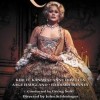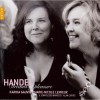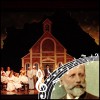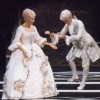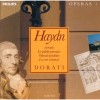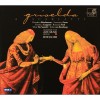歌剧剧本
Tannhäuser (full title Tannhäuser und der Sängerkrieg auf Wartburg / Tannhäuser and the Singers' Contest at Wartburg) is an opera in three acts, music and text by Richard Wagner, based on the two Germanic legends of Tannhäuser and the song contest at Wartburg. The story centres on the struggle between sacred and profane love, and redemption through love (a theme running through almost all Wagner's mature work).
FIRST ACT
When the gods and goddesses fled from Olympus before the advance of Christianity, Venus, retiring to the North, established her court beneath the hill of Hörselberg, in Thuringia.
The opera opens in the hill of Venus, whither Tannhäuser, the minstrel knight, has fled from the troubles of earth. Here the goddess holds her court amid everlasting revels, luring the souls of men to destruction. The stage represents the interior of the Venusbrg. In the background there is a lake in which naïads are bathing, while sirens recline on its banks. On the left of the foreground Venus lies on a couch, with Tannhäuser in a half kneeling attitude before her, his head sunk on her knees. In the center of the stage nymphs are dancing; these are joined by others from the background in the course of the scene, while now and again a chorus of sirens is heard singing the most seductive strains. A rosy light illuminates the whole cave. When the dance is at its height a mist descends, hiding all but Tannhäuser and Venus.
Tannhäuser has passed an entire year in the grotto in a ceaseless orgy of sinful pleasure; he has grown weary of his amorous captivity, and longs for the world above, with its mingled joys and sorrows. He begs the goddess to release him; she, in turn, pleads with him to remain, calling up new scenes of ravishing delight. He again implores her to let him go. After a long struggle he finally regains his liberty be calling on the Virgin Mary, when Venus, with a cry, vanishes, and the entire grotto sinks into the earth with a terrible crash.
When Tannhäuser, who has not changed his position, comes to his senses, he finds himself kneeling upon the grass in a beautiful valley between the Wartburg and the Hörselberg, listening to the tinkling bells of the flock and the piping of a shepherd from a rock above. It is a fresh spring morning, bright with sunshine and blue sky. At the back of the stage is the Wartburg; through an opening in the valley the Hörselberg is seen; while in the foreground on the right is a shrine of the Virgin on a small eminence.
The chant of pilgrims passing on their way to Rome awakens Tannhäuser to a sense of his sin. With deep emotion he breathes a prayer of gratitude at being restored to liberty, and vows to expiate his guilt by a life of abstinence and humiliation. The chant dies away in the distance, while the sound of hunting bugles comes nearer and nearer from the heights. Presently the Landgrave of Thuringia, Tannhäuser’s liege lord, with Wolfram von Eschinbach, Walther von der Vogelweide, and other minstrel knights from the Wartburg, all in hunting array, are seen to descend from a forest path. They greet their old comrade joyfully, ask him whence he has come, and entreat him to return with them to the castle. Tannhäuser replies that he has wandered "in strange and distant lands," where neither peace nor rest were found; that he is at enmity with none, yet they must allow him to depart, as he may never again be one of them. They offer him rest and home with friends, but continue to receive the same answer, till Wolfram mentions the name of the Landgrave’s niece Elisabeth, and tells how the saintly maiden has dropped and pined since Tannhäuser disappeared from the singing contests at the Wartburg. Tannhäuser is deeply touched; he passionately embraces Wolfram and the minstrels, and agrees to join them once more. While the whole hunting retinue of the Landgrave assemble on the stage, the knights express their delight at Tannhäuser’s return. The Landgrave sounds his bugle, and amidst general rejoicing all hasten away to the castle, and the curtain falls.
SECOND ACT
In the Second Act we are at the Wartburg, in the Hall of Song, prepared for one of those minstrel tournaments for which this castle was celebrated in the Middle Ages. Elisabeth enters, singing a greeting to the Hall, which she has not seen since Tannhäuser’s mysterious disappearance. As her song ends, Tannhäuser is led in by Wolfram, and falls at her feet. The Princess begs him to rise, as it is not fit that he who was wont to conquer in that Hall should kneel thus. Asking him where he has tarried so long, she receives the same answer as the Landgrave: "In strange and distant lands." The pure-minded maid does not dream there is any dishonour in his absence, and gladly welcomes him back to her heart. While they sing an impassioned duet, Wolfram, who remains in the background during this interview, reveals, unheard by the lovers, his devotion to the Princess and the hopelessness of his love now that Tannhäuser has returned. In a transport of joy at their reunion, Tannhäuser parts from Elisabeth, and immediately disappears with Wolfram. Elisabeth gazes after Tannhäuser for some time and then turns to greet the Landgrave, who rejoices to find that his niece will once more grace the tourney with her presence. He questions her as to what has drawn her from solitude, but when she tells him he must read the answer in her eyes, he does not press her to divulge her secret.
Now the guests assemble. They are received by the Landgrave and Elisabeth, and marshaled to their places to the strains of the famous march, to which their voices presently add a chorus in honour of the Hall of Song and the Prince of Thuringia. Last of all come the minstrels, who make a stately obeisance to the assembly and are conducted to their seats by pages. The Landgrave, addressing the minstrels, eulogises their services to the Fatherland, and announces that the tourney is held to celebrate the return of Tannhäuser. He suggests "the nature and praise of Love" as the theme of their song, the reward to be whatever the victor may ask from the Princess, who shall bestow the prize.
The singers take their harps and pour forth their improvisations. Wolfram, on whom the lot falls to begin, sings of the chaste ideal worshipped by him "Kneeling with soul devoted"; Walther eulogises the pure fountain of virtue, the source of his inspiration; and Biterolf extols the chivalrous passion of the warrior. Tannhäuser at first leans dreamily upon his harp, but towards the end of Wolfram’s song he starts from his reverie, and interrupts each singer in turn, scoffing at their cold raptures, which recall to him by way of contrast the amorous delights of the Venusberg. He gradually becomes more excited, till a sort of madness seems to take possession of him, and finally he bursts out into a wild paean in praise of Venus herself. All are horror-stricken. The women rush from the Hall; but Elisabeth, who has heard the contest with growing alarm, remains, pale and trembling, supporting herself against one of the pillars of the royal canopy. Tannhäuser stands as in a trance. Then, as the men close round him with drawn swords, Elisabeth throws herself between them and her lover, pleading for his life in the name of the Saviour who died for all. The discovery of his unworthiness has dealt Elisabeth a fatal blow; nevertheless she forgives him and prays earnestly that the hope of pardon may not be denied him. The knights yield to her entreaties and let fall their weapons.
At length Tannhäuser seems to awaken from his trance, and realizing his awful crime and all that he has lost, he falls to the ground in abject repentance. When he finds words for his emotions, and while the knights are declaring their obedience to the voice of Heaven, as revealed through Elisabeth, the heavenly maid, Tannhäuser sings the lines in which lies the whole significance of the catastrophe of Tannhäuser, the keynote of the work --
From doom of wrath to save the sinner,
An angel from on high was sent.
But ah! profanely here to win her,
I would have dared with mad intent!
Oh, Thou, throning above our mortal frailty,
Thou who hast sent this guardian saint to me!
Have mercy, Thou, I cry to Thee despairing!
Oh, from the gulf of error set me free.
The Landgrave pronounces him accursed, banishes him from the land, and bids him seek the sacred shrine at Rome, where alone he may find pardon. A band of pilgrims from every part of the Landgrave’s domain are on their way to the Eternal City. The elders passed through the valley in the morning; the younger men are even now at hand; and their chant is presently heard sounding from below. In listening to it all have relaxed their threatening gestures and assumed a more softened expression. Tannhäuser, whose features are brightened by a ray of sudden hope, turns in the direction from which the sounds proceed, and rushes from the Hall, crying, "To Rome, to Rome!"
THIRD ACT
The curtain rises in the valley beneath the Wartburg, as in the First Act, but the hopeful beauty of the spring has given place to the somber loveliness of autumn and the sun has nearly set. On eminence to the right Elisabeth is kneeling before the shrine in prayer. Wolfram descends from a forest path on the left and stops when he sees Elisabeth. He is a man of noble and devoted nature; and though he himself loves Elisabeth in vain, he hopefully awaits with her the return of the pilgrims, praying that her lost lover may be restored to her, free and forgiven. Presently the pilgrims’ chant, telling of pardon gained, is heard in the valley. Elisabeth rises, and as they file past her one by one she eagerly scans their faces. Alas! Tannhäuser is not among them. She falls on her knees once more, and convinced that all hope of his return must be abandoned, she prays to the Virgin to receive her soul, and to have mercy on him whom she has loved and waited for on earth. Feeling the hand of death upon her, she slowly wends her way back to the castle after bidding Wolfram a silent farewell. Alone in the gathering gloom, Wolfram sings his beautiful address to the evening star, shining brightly overhead.
It is now quite dark, and just as the last strains die away, a figure enters in a ragged pilgrim’s dress, pale and worn. He comes forward with faltering steps, leaning on his staff. It is Tannhäuser, returning from Rome, disappointed and despairing. Absolution, he tells Wolfram, has been denied. Yet, accursed though he be, there is nothing to fear from him. He is only trying to find the path to the Venusberg. Wolfram remonstrates with him, and draws out the story of his pilgrimage and its result. Tannhäuser has been to Rome, but the journey has availed him nothing. He has seen the Pope, who pardoned thousands on the same day, yet declared that for his sin there was no hope of forgiveness till the staff which he held in his hand should put forth leaves and blossom. With this terrible message ringing in his ears, Tannhäuser turned his back on the city, resolving to retrace his steps northward, and return to the embraces of Venus. Spurned and accursed by all, he has had enough of earth, and there is naught left to him but the joys of the Venusberg.
Wolfram tries in vain to dissuade him from his purpose. In response to Tannhäuser’s cries, Venus appears in the midst of her nymphs and sirens, and bids him welcome. Wolfram continues to plead, but Tannhäuser will not yield; and he is on the point of flying to the arms of the goddess, when Wolfram adjures him to resist the evil one by the sacred name of Elisabeth. At the sound of that name Venus and her nymphs sink with a wild shriek into the earth; and Tannhäuser, who has just released himself from the struggle with Wolfram, remains rooted to the spot. The morning breaks and now is heard the solemn hymn of the procession bearing the corpse of Elisabeth preceded by the elder pilgrims. As the bier is carried forward, Tannhäuser falls lifeless by its side, while a band of young pilgrims appear on a height in the foreground bearing the Pope’s staff, which has put forth leaves and blossomed -- a sign that the sinner has been pardoned and redeemed. Sunlight streams over the scene, and the minstrel and elder pilgrims join the younger band in singing the triumphal hymn --
The Lord Himself now thy bondage hath riven;
Go, enter in with the blest to His heaven.
Tannhäuser, as thus presented by Wagner, is a type of manhood "in its passionate desires and ideal aspirations." As the heroes of Greek tragedy were shattered on the rock of inexorable Fate, so the strength of Tannhäuser is broken in its vacillation between sensual delight and spiritual aims, typified by the Venus and the Elisabeth of the drama. The idea of man’s salvation through the love of pure woman, which Wagner had already introduced in "The Flying Dutchman," is common to the folklore of many countries. It is the fundamental idea of the greatest poems and dramas of Germany. It is Goethe’s last word in "Faust" --
The Woman Soul
Leadeth us upward.
So salvation comes to Tannhäuser through the self-sacrificing love of Elisabeth. In a sentence the plot of "Tannhäuser" is the story, which never grows old, of the struggle between good and evil for a human soul, and the sinner’s redemption through the power of a pure woman’s love.






